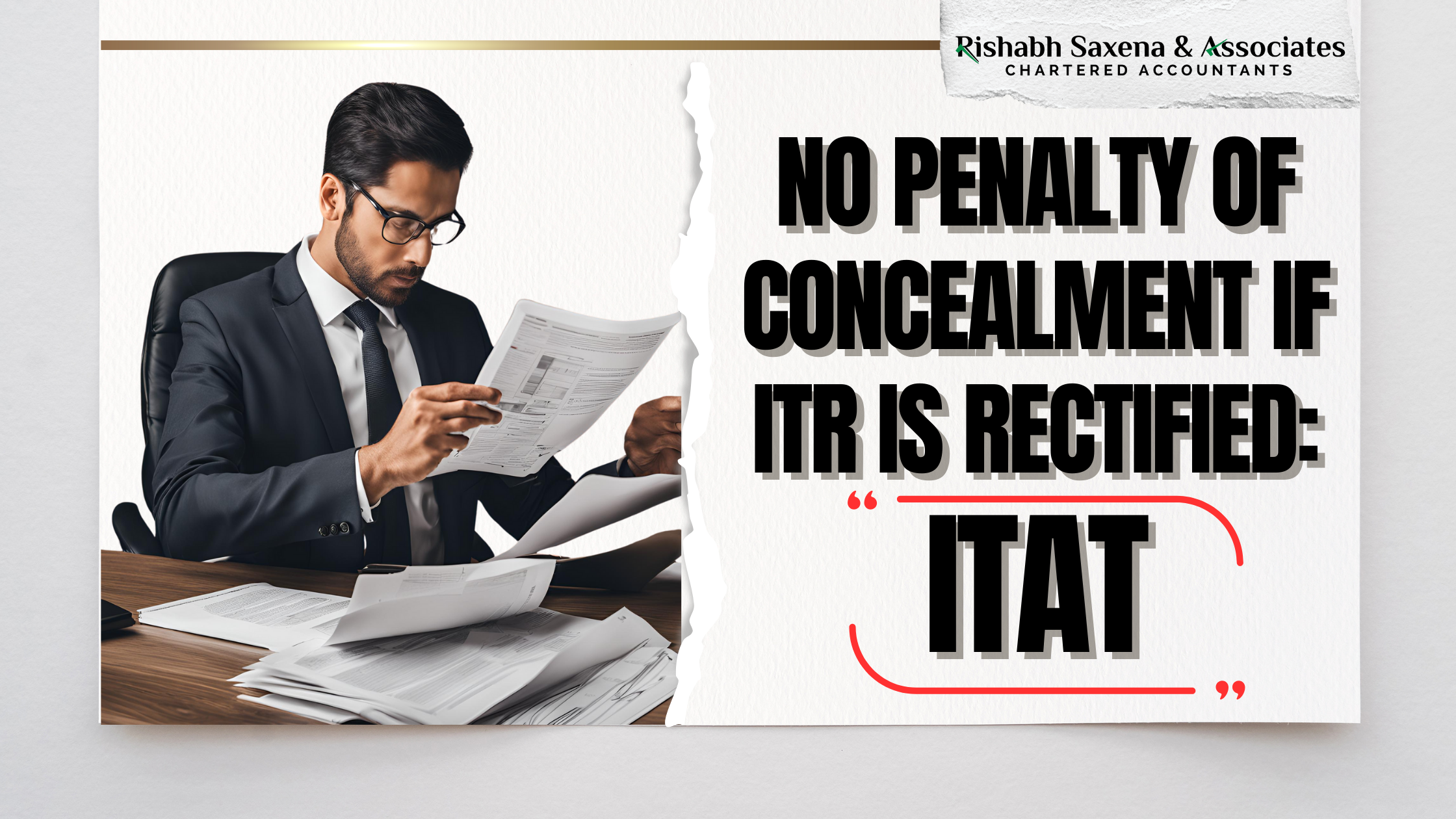Landmark Ruling: “No Penalty” for Income Concealment if ITR is Rectified
In a significant development for taxpayers, the Income-Tax Appellate Tribunal (ITAT) Mumbai bench has ruled that penalties for income concealment cannot be imposed if errors are corrected in a revised tax return. This ruling, which emerged from the case of R. Chatterji, could potentially offer relief to many taxpayers who may inadvertently misreport income or make errors in their tax filings. Given the stringent penalty provisions under the Indian Income Tax Act, this decision is a welcome reprieve and sets a crucial precedent.
The Case of R. Chatterji: A Closer Look
R. Chatterji, a Singapore resident classified as a ‘resident and ordinarily resident’ of India during the financial year 2014-15, faced scrutiny from the Income Tax Department after filing his tax return. Chatterji initially reported a total income of approximately Rs 12 lakh, including 50% of the rental income from a Singapore property he co-owned with his wife. However, discrepancies were discovered when his tax return was scrutinized. It was revealed that in the previous financial year (2013-14), he had mistakenly reported 100% of the rental income from the same property, contrary to his 50% ownership share.
To address this discrepancy and correct other omissions, including unreported interest income, Chatterji filed a revised return. Despite this proactive correction, the tax authorities initiated penalty proceedings under Section 271(1)(c) of the Income Tax Act, accusing him of furnishing inaccurate income details and imposing a hefty penalty of Rs 9 lakh.
ITAT’s Observations and Ruling
The ITAT Mumbai bench, consisting of judicial member Rahul Chaudhary and accountant member Padmavathy S, took a detailed look at the case. The tribunal observed that Chatterji’s initial misreporting was not a deliberate attempt to conceal income but was rather an honest mistake. Importantly, they noted that Chatterji had voluntarily corrected the errors by filing a revised return before the assessment was completed.
The tribunal reiterated a fundamental principle of tax law: penalties should not be imposed when there is no conscious breach of the law. They emphasized that the purpose of penalties under Section 271(1)(c) is to deter deliberate tax evasion, not to punish taxpayers who make genuine errors and take corrective action. Consequently, the ITAT ordered the removal of the penalty imposed on Chatterji, providing much-needed clarity on the application of penalties in cases of revised returns.
Legal Context: Understanding Section 271(1)(c) and Section 270A
Before delving into the broader implications of the ruling, it is essential to understand the legal provisions at play:
- Section 271(1)(c): This section, applicable before 2016, imposed penalties ranging from 100% to 300% of the tax on income that was either concealed or inaccurately reported. The severity of these penalties underscored the importance of accurate tax reporting.
- Section 270A: Introduced in 2016, this section replaced the older penalty provision with a more structured approach. It imposes a 50% penalty for under-reporting and a 200% penalty for misreporting of income. This change aimed to differentiate between minor errors and deliberate tax evasion, offering a more balanced approach to penalties.
Implications of the ITAT Ruling: What Taxpayers Need to Know
The ITAT’s ruling in the Chatterji case has several important implications for taxpayers:
- Relief for Genuine Errors: Taxpayers who inadvertently misreport income or omit certain details from their tax returns can now take corrective action by filing a revised return without the fear of severe penalties. This ruling reinforces the idea that the tax authorities recognize the difference between genuine mistakes and deliberate tax evasion.
- Encouragement to Rectify Mistakes: The decision encourages taxpayers to proactively rectify any errors in their tax returns. By filing a revised return, taxpayers can avoid the harsh penalties that might otherwise be imposed under Section 271(1)(c) or Section 270A.
- Precedent for Future Cases: The ruling sets a precedent that could influence future cases where taxpayers have corrected errors in their returns. It emphasizes the importance of honest and transparent tax reporting and provides clarity on the circumstances under which penalties should be imposed.
- Balancing Compliance and Fairness: The ITAT’s decision strikes a balance between enforcing tax compliance and ensuring fairness. While the tax authorities have the right to scrutinize returns and impose penalties for deliberate tax evasion, they must also recognize when a taxpayer has acted in good faith to correct mistakes.
Conclusion: A Landmark Decision for Tax Compliance
The ITAT’s ruling in the case of R. Chatterji marks a significant step forward in ensuring that penalties under the Income Tax Act are imposed fairly and justly. By distinguishing between deliberate concealment of income and genuine errors corrected through revised returns, the tribunal has provided much-needed clarity and relief for taxpayers. This ruling is expected to resonate widely, encouraging taxpayers to be transparent in their filings and to take corrective action when necessary, without the fear of disproportionate consequences.
As this ruling becomes more widely known, it will likely shape the way both taxpayers and tax authorities approach the issue of income concealment and the imposition of penalties. For taxpayers, the key takeaway is clear: if you make a mistake in your tax return, rectify it promptly through a revised return to avoid severe penalties.





